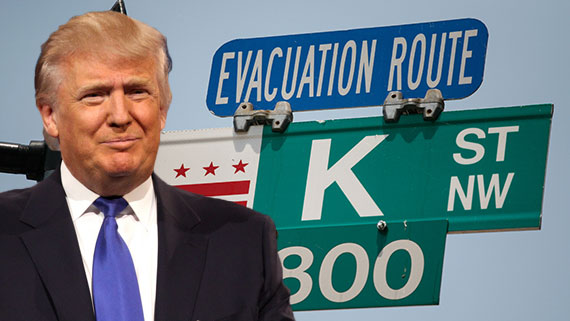When Donald Trump heads to Washington, D.C. next year, he’ll have the power to influence – both at the White House and the agencies he appoints leaders to – a long laundry list of issues important to the real estate industry. The docket could include tax reform, the Dodd-Frank act and even…drones, the unmanned aerial vehicles industry pros use to snap photos, inspect properties and help maintain buildings.
Lobbyists in Washington have held meetings this year regarding drones with the Federal Aviation Authority, the National Telecommunications and Infrastructure Agency and the White House Office of Science and Technology, lobbying disclosures show — all of which are offices Trump will appoint or nominate leaders to.
“The reason the White House is important is because the White House appoints these people,” said Kenneth Trepeta, head of the Washington, D.C.-based Real Estate Services Provider Council lobbying group. “The new administration under President-elect Donald Trump [TRDataCustom], who wanted to repeal the Dodd-Frank law, will have tremendous influence.”
And when he gets there, Trump will find an active lobby ready to press the flesh.
In the wake of the Great Recession, the real estate lobby beefed up its footprint in Washington. Spending jumped 19 percent to $77.4 million from 2010 to 2015, the third-largest increase behind the technology and retail lobbies, according to the Center for Responsive Politics.
Real estate remained outside the top 10 lobbying industries in 2015 (pharmaceuticals and health took the top spot with $240.54 million spent), but appeared to make up some ground through the first three quarters of 2016.
And while much of that jockeying takes place on Capitol Hill, these groups hold plenty of policy sessions with the White House, Executive Branch departments and independent agencies the president appoints leaders to: meaning they’re looking to interact with the Trump Administration next year on a variety of issues.
At the head of the increase in lobbying dollars is the National Association of Realtors, which since 2012 has been the second-largest spender behind the U.S. Chamber of Commerce. The two groups have spent $45.36 million and $79.2 million, respectively, so far this year.
A spokesperson for the NAR declined to comment, but forwarded The Real Deal a statement NAR president William Brown made following the election, saying new leadership would bring changes to policies affecting housing, homeownership and real estate investment.
“It’s impossible to know right out of the gate what those changes will be, but our priorities remain the same,” he said, citing agenda items like “protecting policies like the mortgage interest deduction and the state and local property tax deduction that help homeowners reach their financial goals.”
“The same is true for 1031 like-kind exchanges, which are absolutely critical for real estate investment,” he added. “It’s our job to remind legislators that 1031 exchanges aren’t a tax break, but rather a deferral that encourages investment back into the economy.”
Representatives for NAR, for example, have had discussions this year with the Treasury Department on anti-money laundering issues and credit availability, as well as the Consumer Finance Protection Bureau on disclosures and regulations regarding the Real Estate Settlement Procedures and Truth in Lending acts.
Trump will appoint a new Treasury Secretary as a member of his Cabinet – possible names include Colony Capital chairman Thomas Barrack Jr., former Goldman Sachs executive Steven Mnuchin and even Blackstone Group’s Jonathan Gray – and the CFPB effectively became an executive agency after a federal appeals court ruled the Commander-in-Chief has the power to remove its director.
Whoever the new CFPB director is will likely oversee a proposed amendment to the “Know Before You Owe” regulation, which has real estate pros concerned over a growing reluctance of lenders and title companies to share closing disclosure information.
NAR’s taken up niche issues as well, such as the drone rule and the “Internet of Things,” lobbying disclosure forms show.
CFPB reform is one of the big topics for Trepeta’s Real Estate Services Providers Council as well.
“People who want see changes will most likely advocate for President-elect Trump to pick somebody who’s got a more balanced approach than current director Richard Cordray,” Trepeta said.
During the campaign Trump talked extensively about simplifying the tax code.
Jeffrey DeBoer, president of the Real Estate Roundtable, said one of the issues his group will look to make an impact on is talks about depreciation tax deductions (which Trump himself used extensively).
The Roundtable commissioned researchers at the Massachusetts Institute of Technology, which produced a study finding that buildings depreciate a little more rapidly than the current law allows.
The group plans to take the study to Trump’s new Treasury Secretary.
“The idea is that when tax reform moves forward, that the policy makers – in this case the Treasury Department and members of the Finance Committee – are on the same page” in terms of the facts, DeBoer said.
